Best Free Video Editing Software and Online Tools
If you want to produce a short movie, combine images into a slideshow, or perform any other multimedia manipulations, you will need reliable video editing software. However, if you're a student or on a budget, you may be limited to free programs, which could be hard to determine if they're good.
This article provides the list of top 12 free video editors for different operating systems. Check them out, read the description, and choose who will be your new best friend for media production.
Best free video editors: summary table
| Video editor | OS | Good for beginners | Good for professionals | Overall rating |
|---|---|---|---|---|
| Icecream Video Editor |
Windows
|
Yes
|
Yes
|
5.0 |
| DaVinci Resolve |
Windows
macOS
|
No
|
Yes
|
4.8 |
| VideoProc |
Windows
macOS
|
No
|
Yes
|
4.8 |
| ShotCut |
Windows
macOS
|
No
|
Yes
|
4.5 |
| OpenShot Video Editor |
Windows
macOS
|
Yes
|
Yes
|
4.5 |
| iMovie |
macOS
|
Yes
|
No
|
3.5 |
| Movie Maker |
Windows
|
Yes
|
No
|
3.5 |

How we picked apps to edit videos
There are so many different video editing software available, so it can be confusing to decide which one would be best for you. To help you do so, we tested several video editors based on the following criteria:
- A video editor should not only support various video formats but image and audio files as well.
- The program’s interface should be user-friendly and intuitive to allow people with different expertise levels to be able to work with it.
- The toolkit should provide all the necessary basic video editing options with the addition of other advanced features.
- The app is free to download and use, so anyone can use it (although there may be a PRO version available).
1. Icecream Video Editor
Icecream Video Editor is an ideal choice for anyone looking to produce professional-looking videos in no time. With its intuitive timeline and drag-and-drop functionality, users can trim, split, and merge video clips effortlessly, while also adding various effects, transitions, and text overlays to enhance their projects.
Being suitable for both beginners and experienced users, this video editor proves to be one of the best free video editing software for Windows.
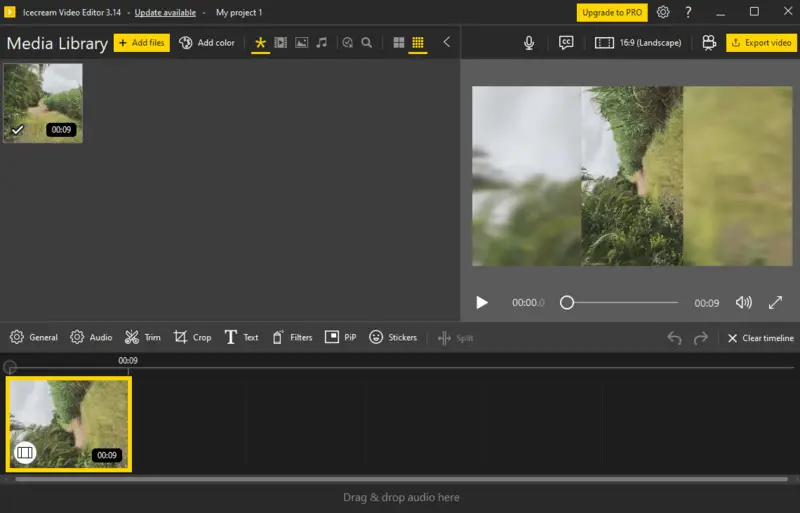
Key features:
- Advanced tools. The ability to add picture-in-picture, text overlays, subtitles, and more.
- Working with audio. Audio editing, including adjusting volume levels and adding background music.
- Transitions. Tools to apply various visual effects, filters, and transitions to enhance video projects.
- Video formats. Flexibility in handling various video formats: MP4, AVI, WebM, MOV, etc.
- Image formats. Support for image formats - JPG, PNG, GIF, etc.
- Intuitive interface. The interface is designed for effortless navigation and user-friendly access.
- Drag-and-drop. Easily add media files and effects with simple drag-and-drop actions.
- PRO version. Get video editor PRO to use it for commercial purposes .
- Speed adjustment. Slow down or speed up clips for dramatic or comedic effects.
2. DaVinci Resolve
DaVinci Resolve stands out as a powerful and versatile video editing software, offering a comprehensive suite of tools for both professionals and enthusiasts. With a friendly interface and robust performance, the program streamlines the editing process while maintaining high-quality results. No wonder producers in Hollywood utilize this application for post-producing their movies.
Whether working on a personal project or a professional task, users benefit from the video editor's extensive range of creative options and seamless integration across different stages of video production, from editing to final mastering.
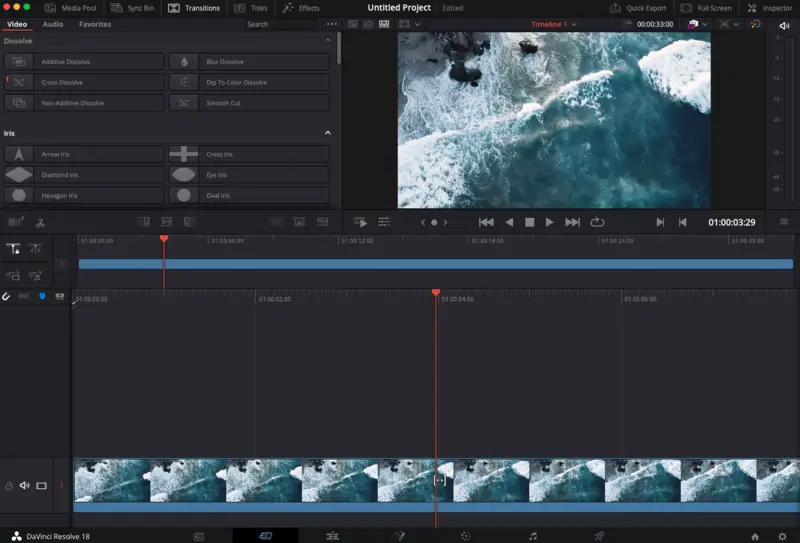
Key tools:
- Extensive editing functions. Comprehensive video editing interface with timelines and support for multicam.
- Transitions and effects. Create impressive visual effects and animations with ease.
- Color correction. Fine-tune colors or light and achieve cinematic effects effortlessly.
- Audio post-production. Professional-grade audio recording, editing and mixing capabilities.
- Collaboration. Engage a team to work on one project.
Disadvantages:
- Complexity. Although the interface is clean, some users may find the program overwhelming.
- Limitations. There is a free version of the video editor but some advanced tools require to buy a license.
3. VideoProc
VideoProc is a video editing software that's quite popular among vloggers. It provides a comprehensive toolkit for editing and enhancing videos. Additionally, the app supports a broad range of input and output formats, ensuring compatibility across different devices and platforms.
Whether editing family videos or handling professional projects, this free video editor offers the necessary tools for a top-notch experience.
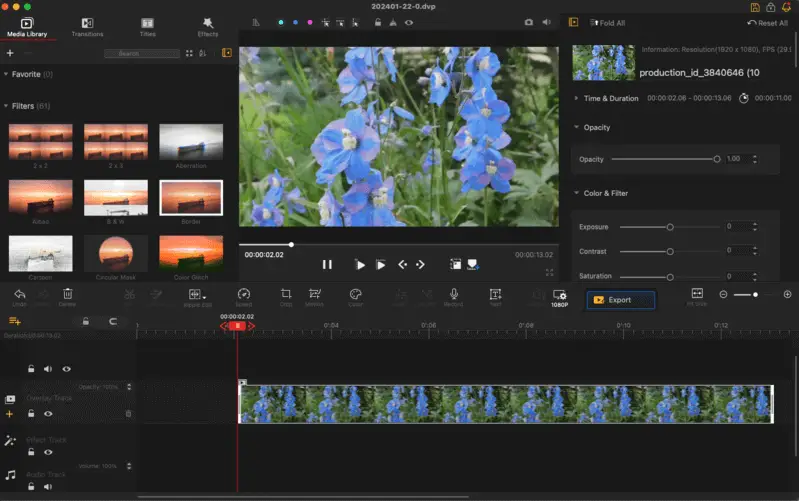
Key tools:
- The basics. Trim, merge, crop, rotate videos, apply effects, add titles and transitions, etc.
- Advanced tools. Adjust opacity, exposure, and contrast of the footage, and fix the audio volume and other settings.
- Video stabilization. Improve shaky footage for smoother viewing. - Subtitles. Enhance accessibility by easily adding subtitles to videos.
Disadvantages:
- Non-intuitive. Most individuals will need time to get used to the program's loaded interface.
4. ShotCut
Shotcut is an open-source video editing software. It offers many features for editing and encoding videos. Its powerful toolkit allows it to work with various video formats and provides advanced options, enabling users to create professional-looking videos with ease.
Whether you're a content creator, filmmaker, or hobbyist, this app has the tools needed to bring your vision to life.
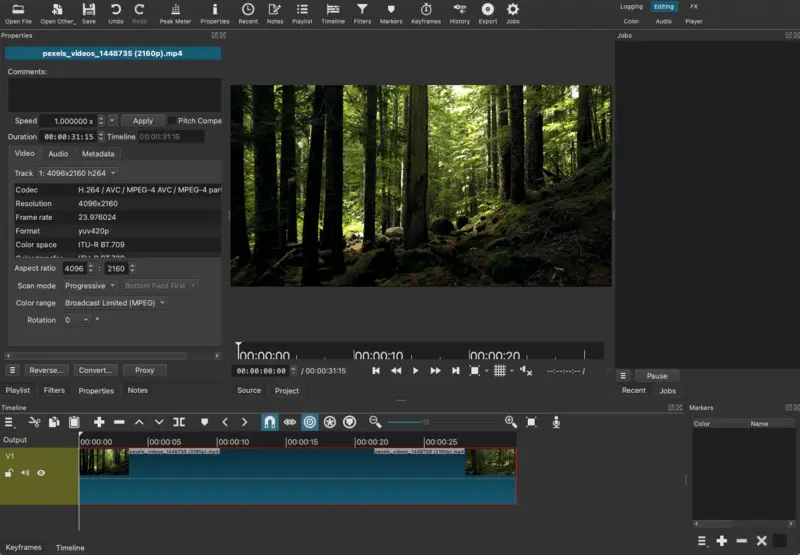
Key tools:
- Flexible editing tools. Trim, merge videos, and perform other manipulations effortlessly on the timeline.
- Customizable filters and effects. Apply a variety of visual filters and effects to enhance your videos.
- Audio editing. Adjust audio levels, add effects, and incorporate soundtracks with precision.
- Advanced options. Utilize features like keyframes, chroma-keying, and compositing for professional-grade editing.
- Real-time previews. See changes as you apply them with GPU-accelerated rendering.
Disadvantages:
- Learning curve. It takes time to figure out what each tool does if you're new to video editing.
5. OpenShot Video Editor
OpenShot Video Editor is a user-friendly, open-source video editing software ideal for beginners and professionals alike. Its intuitive interface allows for easy navigation and quick learning. The program supports multiple audio and video formats, as well as provides advanced editing tools.
OpenShot offers a wide range of features including trimming, slicing, animation, and keyframe functionality. Users can also add titles, effects, and transitions to their videos effortlessly.
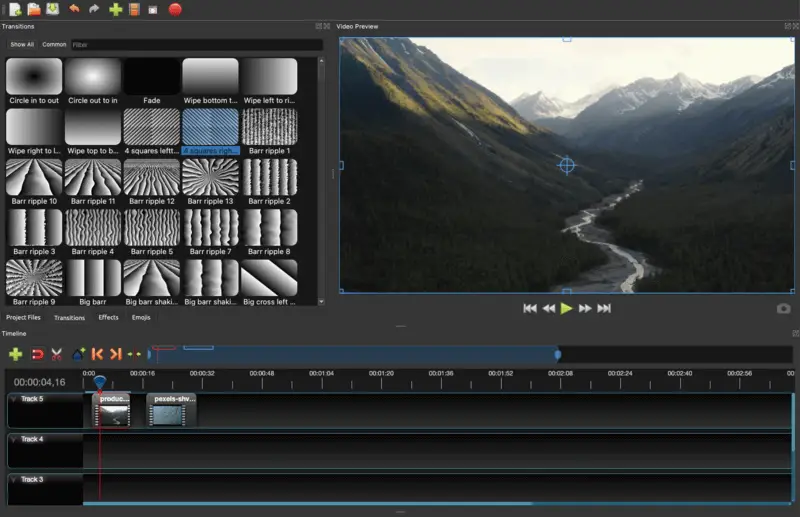
Key tools:
- Timeline editing. Seamlessly order, combine, cut videos on the timeline.
- Video effects and transitions. Access a library of visual effects, filters, and transitions to enhance your videos.
- Advanced editing tools. Access advanced features such as chromakey, 3D integration, and more.
Cons:
- Inconsistent layout. If you're not aware of the ability to customize the interface's windows, you may accidentally remove utilities from the toolbar.
6. iMovie
iMovie is a video editing software developed by Apple, tailored for macOS and iOS devices. It offers a range of intuitive tools for creating high-quality videos with ease. With its simple interface and seamless integration with other Apple products, this app is a popular choice for beginners but experienced users also like it.
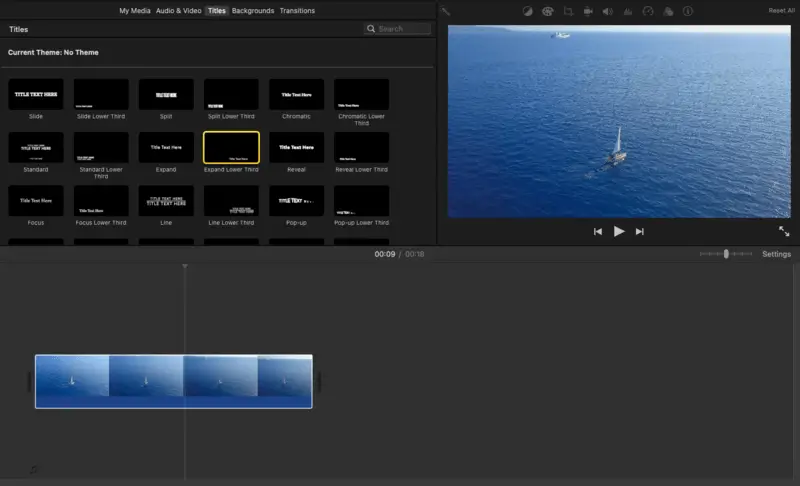
Key tools:
- Timeline editing. Users can easily import, and edit videos, with options for trimming, cutting, and adding transitions.
- Themes and templates. Choose from a variety of themes and templates for quick video creation.
- Transitions and effects. Add cinematic transitions and visual effects to your videos.
- Titles and credits. Customize text overlays and titles to add context and style.
- iCloud Integration. Access and sync projects across all Apple devices seamlessly.
- Green screen. Utilize chroma key to replace backgrounds and create cinematic scenes.
Cons:
- Lack of functionality. There are no advanced video editing tools or special effects (like green screen), that professionals would appreciate.
7. Movie Maker
Movie Maker is a user-friendly video editing software created by Microsoft for Windows users. It provides essential tools for creating and manipulating the footage effortlessly. With its simple yet versatile features, the program is a reliable solution for beginners and casual video enthusiasts.
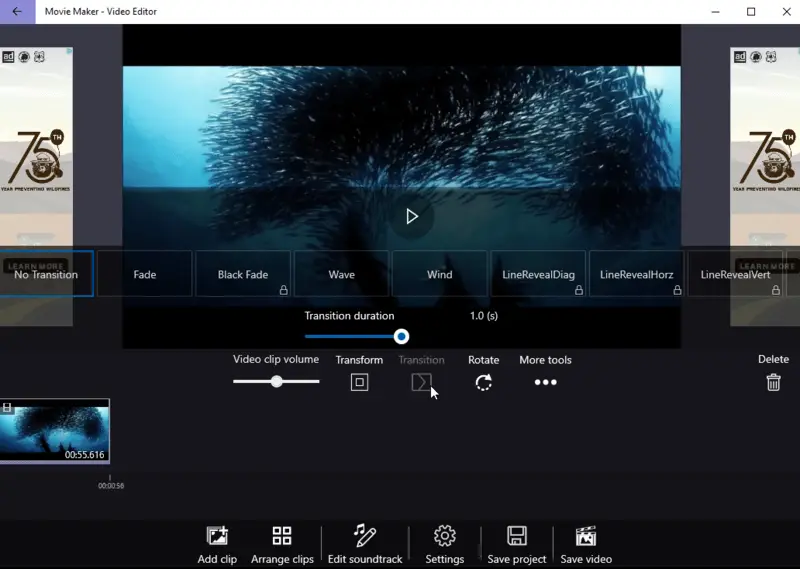
Key tools:
- Basic editing. Cut, rearrange, merge, trim video clips, add music, etc.
- Transitions and Effects. Add transitions and visual effects to enhance the viewing experience.
- Text overlays. Insert titles, captions, and credits to provide context and information.
- Built-in effects. Access a library of pre-installed effects for creative customization.
Cons:
- Restrains. The software lacks sophisticated video editing tools, which can be limiting for advanced tasks.
BONUS: web-based video editors
Sometimes it may be more convenient to use an online video editing tool rather than a dedicated software. For instance, if you have multiple devices with different operating systems, you cannot synchronize apps on them. However, you can employ an online platform that will keep your projects accessible with a simple login.
| Video editor | OS | Good for beginners | Good for professionals | Overall rating |
|---|---|---|---|---|
| Clipchamp |
Online
|
Yes
|
Yes
|
4.3 |
| VEED.IO |
Online
|
Yes
|
Yes
|
4.0 |
| Invideo |
Online
|
Yes
|
Yes
|
3.8 |
| Video Candy |
Online
|
Yes
|
Yes
|
3.7 |
| Clideo |
Online
|
Yes
|
Yes
|
3.5 |
8. Clipchamp
Clipchamp is an innovative online video editor catering to various post-production needs. All the editing happens in the cloud-based platform, saving storage on your device. The editor has an integrated screen recorder. For inexperienced content creators, there are templates and a stock library to help you get started on multimedia production.
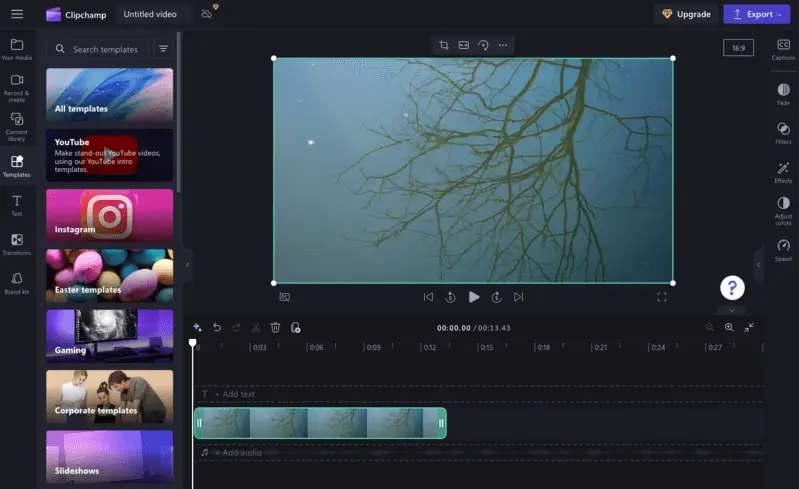
Key tools:
- Video editing tools. Join, split, slow down or speed up video clips effortlessly.
- Effects and filters. Apply transitions, visual effects, and filters to enhance your videos.
- Green screen effects. Eliminate backgrounds and substitute them with alternative visuals to achieve sophisticated compositing effects.
- Integration. Seamlessly share your content on platforms like YouTube, Vimeo, and Google Drive.
Disadvantages:
- Internet dependency. The service may be problematic to use if the internet connection is unreliable.
9. VEED.IO
VEED.IO is an intuitive online video editing platform. It offers all the basic tools for post-production. There is also a screen recorder among its functionality. With the online service, users can edit their projects from anywhere, rendering it a convenient choice for both individuals and businesses.
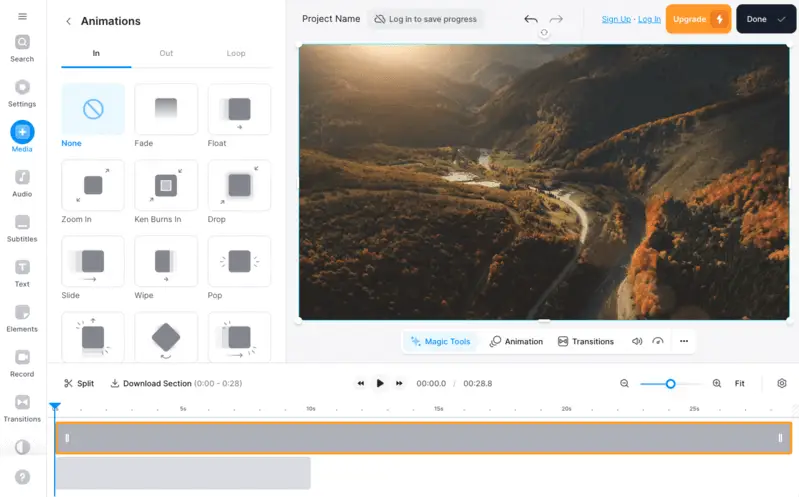
Key tools:
- Video editing tools. Split, combine, crop, and adjust video clips effortlessly.
- Text and subtitles. Add text overlays and subtitles to enhance communication.
- Templates and stock files. Access customizable templates and additional footage to apply visual effects to elevate video content.
- Audio editing. Adjust audio levels, add music to the video, and incorporate sound effects seamlessly.
Cons:
- Limitations. To save the project, you need to log in. Also, all the tools have the options that require an upgrade.
10. Invideo
Invideo is an advanced online video creation platform designed for businesses and marketers. Users can easily produce professional-quality videos without extensive editing skills. The service utilizes artificial intelligence to automate various aspects of the video creation process, such as text-to-speech conversion and scene suggestions.
.webp)
Key tools:
- Simple tools. All the basic functionalities are included: trim, mute video, add music, crop, add transitions, etc.
- Customizable templates. Access a library of templates for various video types and industries.
- Effects and animations. Enhance videos with a wide range of effects, transitions, and animations.
- Artificial intelligence. Utilize AI-powered tools for automatically converting text to speech and offering suggestions for scenes.
- Media library. Access a vast collection of stock images, videos, and music for use in projects.
- Collaboration tools. Collaborate with team members by sharing and working on projects together simultaneously.
Cons:
- Limits on export. To save the edited video, you have to buy a subscription.
11. Video Candy
Video Candy is an online tool designed for a range of multimedia processing needs. It provides users with the capability to convert, compress, and edit video files through a straightforward web interface. The platform supports a variety of input and output formats, including popular ones like MP4, AVI, and MOV, allowing for versatile video handling.
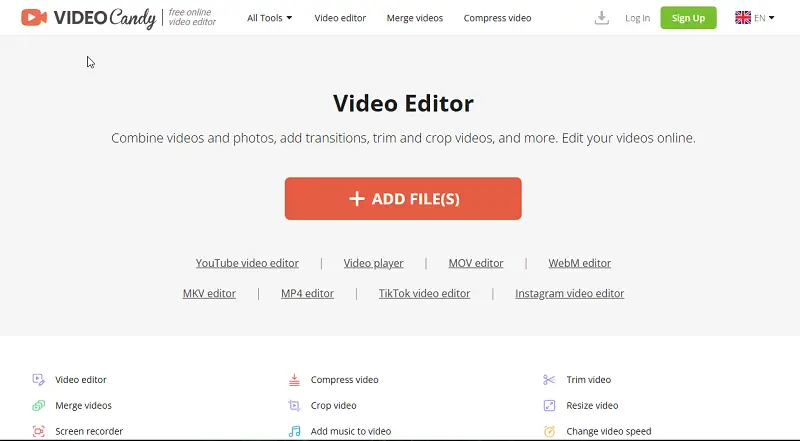
Key tools:
- Stop motion maker. Create stop-motion animations by sequencing individual frames or images into a cohesive project.
- Audio converter. Convert audio files between different formats, such as MP3 and WAV.
- Loop video. This is useful for making looping background clips, GIFs, or continuous playback of specific segments.
- Crop and resize. Adjust dimensions to fit different platforms and aspect ratios.
Cons:
- Limits on file size. Users without a subscription can process files up to 2 GB in size.
12. Clideo
Clideo is an online video editor ideal for quick, browser-based changes. It caters to casual users, educators, and marketers looking to create or refine projects without the need for complex software. The platform focuses on speed and accessibility, allowing you to merge, cut, compress, and enhance clips in just a few clicks.
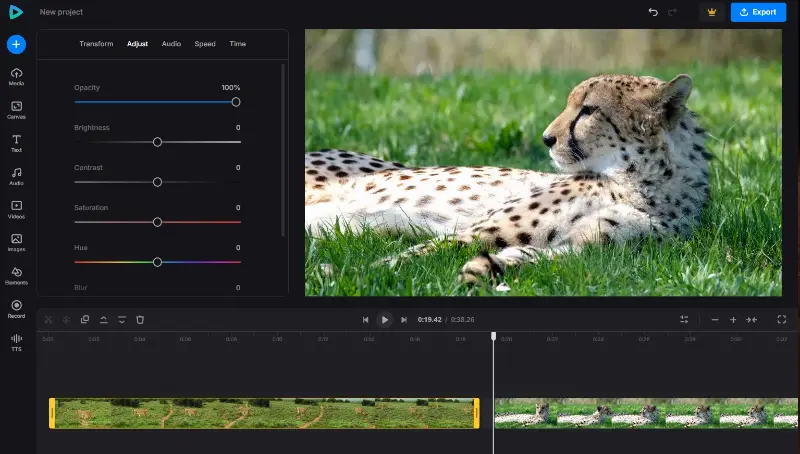
Key tools:
- Basic suite. Includes essential tools like trim video, merge, crop, rotate, and mute.
- Browser-based access. Works entirely in the cloud—no software download required.
- Subtitles. Add customizable text directly to your videos.
- Slideshow creator. Combine images, music, and clips into seamless videos.
- Secure handling. Ensures privacy with encrypted uploads and automatic file deletion.
Cons:
- Watermarks on free plan. Results exported without a subscription will include a logo.
Video editing tips
- Organize your footage. Before you start editing, ensure your clips are well-organized. Create folders for different scenes, takes, or shots to streamline your editing process.
- Plan your edit. Have a clear vision of the story or message you want to convey through your video. Outline for yourself key scenes, transitions, and effects beforehand.
- Master keyboard shortcuts. Learn and utilize hotkeys to speed up your workflow. This can significantly increase your efficiency and productivity while editing.
- Color correction and grading. Enhance the visual appeal of your video by tuning the lighting. Adjust exposure, contrast, saturation, and color balance to achieve a cohesive and professional look.
- Maintain consistent audio levels. Pay attention to audio levels throughout your video to ensure consistency. Use audio meters and tools within your editing software to adjust volume levels and prevent sudden jumps or drops in audio.
- Focus on transitions. Smooth transitions between shots can greatly enhance the flow and continuity of your video. Experiment with different transition effects but remember to use them sparingly and purposefully.
- Add titles and graphics. Incorporate titles, captions, and graphics to provide context, highlight key points, or enhance visual appeal. Choose fonts, colors, and styles that complement your video's theme and tone.
- Seek feedback and iterate. Once you've completed a draft of your video, seek feedback from peers or colleagues. Be open to constructive criticism and use it to refine and improve your projects. Iterate on your edit until you're satisfied with the final result.
Remember, video editing is both an art and a skill that improves with practice. Keep experimenting, learning, and refining your techniques to develop your unique editing style.
FAQ
- How do I choose the right video editing software for my needs?
- When selecting video editing software, consider your editing needs, preferred features, and level of expertise. Look for intuitive interfaces, essential editing tools like trimming and transitions, and compatibility with your operating system. Additionally, assess any limitations or watermarks associated with free versions to ensure they meet your project requirements.
- Are there any free video editors specifically designed for beginners?
- Yes, several free video editors are designed with beginners in mind, offering simple interfaces and basic editing features. These editors typically provide guided tutorials and templates to help users get started, making them accessible for those new to video editing.
- Can I use free video editors for commercial projects?
- Free video editing software may have usage restrictions for commercial projects, depending on the software's license agreement. Some free editors allow commercial use with proper attribution, while others may require purchasing a commercial license or upgrading to a paid version for unrestricted usage. Always review the software's terms of service to ensure compliance with commercial usage policies.
- How does color grading improve my video?
- It enhances the visual mood of a clip by adjusting brightness, contrast, saturation, and hues. It helps create a cinematic look, corrects color imbalances, and ensures consistency across shots, which can elevate the production quality.
- What is the importance of keyframe animation in video editing?
- It allows you to define specific points in a video where certain properties (like position, scale, or opacity) change over time. This is essential for creating smooth transitions, motion graphics, and animated effects .
Conclusion
The availability of free video editing software for both Windows and Mac provides users with a diverse range of options to explore their creativity without breaking the bank.
Whether you're a beginner or a seasoned editor, these top 7 free video editors offer robust features and reliable performance. From basic trimming and merging to advanced effects and animations, the programs cater to a wide spectrum of editing needs, empowering users to produce professional-quality videos.


